

Scientists Discover That Microplastics May Harm Our Immune System. It was announced today at the Plastic Health Summit that researchers from the University Medical Centre (UMC) Utrecht discovered that microplastics cause accelerated cell death in humans and are harmful to our health.
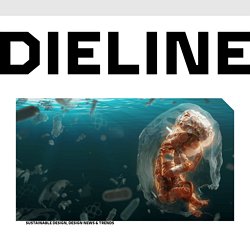
Led by Assistant Professor at the UMC Utrecht Center for Quantitative Immunology Nienke Vrisekoop, the study found that immune cells that come into contact with microplastics die nearly three times faster than those that don’t. This particular type of cell death can potentially trigger an inflammatory response in the human body. The experiment consisted of covering microplastics in blood plasma placed in a culture dish along with human immune cells; 60% of the cells died within 24 hours of coming within contact of those same microplastics, while only 20% died when they weren’t exposed.
Microplastics lijken gevaarlijker dan tot nu toe gedacht. Vaginal mesh: Tests on plastic material 'way less' thorough than on washing machine. By Charlotte Lomas, news correspondent Testing on the plastic material used in vaginal mesh implants "is way less than you would see on a vacuum cleaner or a washing machine", a world expert has told Sky News.
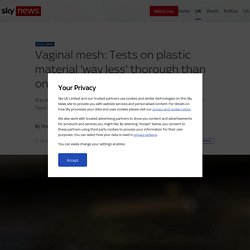
The use of vaginal mesh to treat incontinence is currently suspended in the UK, pending the results of an independent safety review after thousands of women reported devastating complications. Chartered chemist Dr Chris DeArmitt has been arguing the material used in the mesh is not safe and his expertise has been called upon during court action against vaginal mesh manufacturers. His testimony that the polypropylene plastic should not be used inside the body has helped 9,000 women settle out of court. Dr DeArmitt, who is a consultant to the top technology firms in America, told Sky News: "I see an absolute disregard for proper testing. Prof. J.W. Cohen Tervaert FDA meeting breast implants March 25th 2019. Autoinflammatory/autoimmunity syndrome induced by adjuvants (Shoenfeld's syndrome) in patients after a polypropylene mesh implantation. In both hernia repair and pelvic organ prolapse surgery, polypropylene (PP) meshes are increasingly used.
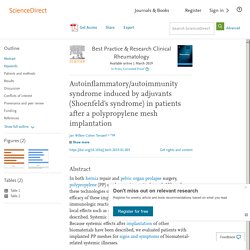
Although these technologies offer tremendous clinical benefits, the efficacy of these implants can be hindered by the body's immunologic reaction to the implanted material. Undesirable local effects such as chronic pain have been extensively described. Systemic effects, however, are not yet reported. Israeli scientists say they've created first fully personalized tissue implant. Researchers at Tel Aviv University say they have created the first fully personalized tissue implants, based entirely on a patient’s own cells.
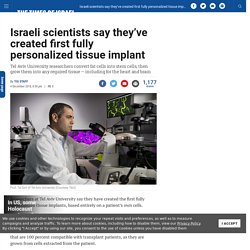
According to Prof. Tal Dvir of TAU’s Department of Molecular Microbiology and Biotechnology and the Department of Materials Science and Engineering, researchers have managed to create tissue for various organs that are 100 percent compatible with transplant patients, as they are grown from cells extracted from the patient. The process has been successful with animal subjects, and the scientists hope human trials could follow soon.
Get The Start-Up Israel's Daily Start-Up by email and never miss our top stories Free Sign Up. Bmj. Sterilization considerations when selecting a medical plastic. The pains and pitfalls of polymers in medical devices. Passing the test: Why patient safety is paramount - Medical Plastics News. Thor Rollins, Piet Christiaens and Matthew R Jorgensen, Nelson Labs, explain why E&L testing offers an expedited path towards enhanced patient safety.
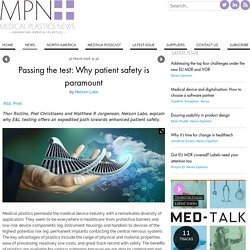
Medical plastics permeate the medical device industry with a remarkable diversity of application. They seem to be everywhere in healthcare: from protective barriers and low-risk device components (eg. instrument housings and handles) to devices of the highest potential risk (eg. permanent implants contacting the central nervous system). The key advantages of plastics include the range of physical and material properties, ease of processing, relatively low costs, and great track record with safety. The benefits of plastics are available for various scenarios because we are able to understand and assess the risk associated on an application by application basis. Plastic cups have more protective additives than surgical mesh. PUBLISHED: 20:35 19 May 2018 | UPDATED: 20:45 19 May 2018 Kath Sansom Chris DeArmitt, is a leading chemist and an independent consultant to the Fortune 100.
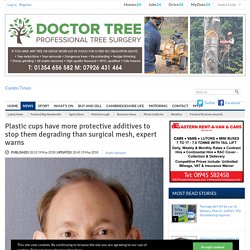
Archant Boston Scientific makes a range of plastic surgical mesh. Researchers raise alarm after chemical leak found in common plastic. Medical researchers at the University of Alberta say that two chemicals leaking from plastic laboratory equipment were so biologically active they ruined a drug experiment.
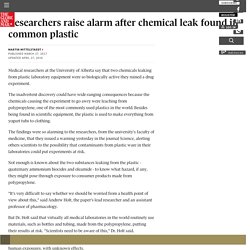
The inadvertent discovery could have wide-ranging consequences because the chemicals causing the experiment to go awry were leaching from polypropylene, one of the most commonly used plastics in the world. Besides being found in scientific equipment, the plastic is used to make everything from yogurt tubs to clothing. The findings were so alarming to the researchers, from the university's faculty of medicine, that they issued a warning yesterday in the journal Science, alerting others scientists to the possibility that contaminants from plastic ware in their laboratories could put experiments at risk.
Breaking! Nieuw inzicht over het ASIA borstprothese syndroom. How Your Body Reacts To A Medical Implant Depends On Age, Researchers Want To Know Why. Polypropylene mesh: evidence for lack of carcinogenicity. Preclinical Bioassay of a Polypropylene Mesh for Hernia Repair Pretreated with Antibacterial Solutions of Chlorhexidine and Allicin: An In Vivo Study. Toxic Chemicals Released From Polypropylene Plastic. By Brenda Fulmer This story from Advancing Green Chemistry, a group dedicated to finding healthier alternatives to harsh chemicals, concerns a research article in June 2010 studying the toxicity of polypropylene plastic used in sutures and hernia and transvaginal mesh.
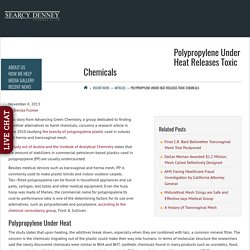
A study out of Austria and the Institute of Analytical Chemistry states that the amount of stabilizers in commercial petroleum-based plastics used in polypropylene (PP) are usually undercounted. Besides medical devices such as transvaginal and hernia mesh, PP is commonly used to make plastic blinds and indoor-outdoor carpets. Talc–filled polypropylene can be found in household appliances and car parts, syringes, test tubes and other medical equipment. De gevaren waarvan de chemiereuzen niet willen dat u ze kent - Wetenschap. Identification of degradation products of antioxidants in polyolefins by liquid chromatography combined with atmospheric pressure photoionisation mass spectrometry. Abstract.

4679 16 Kundeninfo en. Mostynemail.docx. Boston Sci Accused of Racketeering, Using Counterfeit Resin. Boston Scientific accused of using counterfeit ingredients - Crossroads Today. By Jackie Wattles NEW YORK (CNNMoney) -- A class action lawsuit against Boston Scientific made public Thursday alleges the company used counterfeit material from China to manufacture toxic vaginal mesh implants.
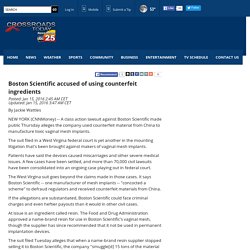
The suit filed in a West Virgina federal court is yet another in the mounting litigation that's been brought against makers of vaginal mesh implants. Patients have said the devices caused miscarriages and other severe medical issues. A few cases have been settled, and more than 70,000 civil lawsuits have been consolidated into an ongoing case playing out in federal court. The West Virgina suit goes beyond the claims made in those cases. Boston Scientific accused of using counterfeit pellets in pelvic. Attorneys for a West Virginia woman suing the makers of a product used to treat pelvic organ prolapse and urinary incontinence claim confidential documents the company turned over in related complaints suggest some of the mesh being implanted in women isn’t even the real deal. The complaint, which names Teresa Stevens as lead plaintiff, was filed Friday, Jan. 15 in federal court in Charleston by attorneys with the Houston, Texas-based Mostyn Law Firm and Harry Bell of Harry F.
Bell Law in Charleston. It alleges Boston Scientific, maker of Advantage mesh, panicked a decade ago when its U.S. supplier cut off its supply of Marlex, the pellets used to make Boston Scientific’s mesh products, and substituted a counterfeit product its people found in China without notifying the women in whom it was implanted or the U.S. Food & Drug Administration of the change. Marlex — more specifically, Marlex HGX-030-1 — is a polypropylene compound developed by Phillips Sumika, an American company. Mostyn Law: RICO case targets company over tainted vaginal implants. HOUSTON, Jan. 14, 2016 /PRNewswire-USNewswire/ -- Mostyn Law, a Houston-based firm, has accused a leading U.S. medical company of running an international conspiracy that sold defective vaginal surgical mesh, made of counterfeit supplies it smuggled from China. The firm, headed by attorneys Amber and Steve Mostyn, sued Boston Scientific Corp. and three other companies under the Racketeering and Corrupt Organizations Act (RICO) on behalf of women who have suffered severe discomfort, bleeding, infections, painful intercourse, urinary problems and other complications from the plastic mesh implants.
The class-action lawsuit says that after losing its U.S. supplier of the synthetic resin to produce the mesh, Boston Scientific bought unverified, substandard material from a known counterfeiter in China. The company took extraordinary measures to avoid being caught by U.S. and Chinese authorities, at times acting like a drug dealer to hide multiple overseas shipments, the suit says. The U.S. Possible allergy to polypropylene mesh. Thank you for your inquiry. We have dealt with a very similar question regarding a possible allergic reaction to polypropylene mesh. For your convenience, I have copied the previous question and our response below which was posted on 4/25/2012. Unfortunately, I could find no additional studies in the literature since that response was posted. As you can see from our answer to the previous inquiry, there is a dearth of scientific literature in this area. However, I would interpret any testing in this area with caution since, at least according to the review of the literature that I have made, there is no available standardization of testing that has been published allowing one to distinguish normal from sensitized individuals.
Patent US3054406 - Surgical mesh - Google Patents. Mostyn Law calls on FDA and Boston Scientific to Stop the Use of Counterfeit Surgical Mesh.